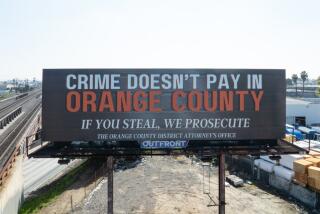Courts Turning to Public Shaming of Wrongdoers
- Share via
GRAND RAPIDS, Mich. — “Health care fraud does not pay,” the full-page newspaper ad warned.
And there in big letters for all to see, federal prosecutors believed, was proof.
In addition to prison time and a fine for billing the government for medical services he did not perform, podiatrist Richard Gorosh of Lansing, Mich., was ordered to announce his guilty plea to the public through full-page ads in two newspapers and a professional journal.
It’s a kind of sentencing that’s beginning to catch on with prosecutors in federal courts after years of use in lower courts. And it is stoking debate among jurists over what role, if any, public shaming should play in the judicial system as opposed to more traditional sentencing, like prison time.
“The idea of shaming is that it doesn’t do society much good to put a productive, nonviolent member of society into jail,” said Peter Henning, a professor of criminal law at Wayne State University Law School in Detroit. “But maybe we can benefit from him stating publicly, ‘I did this, and this is wrong.’ It’s sort of like a scarlet letter.”
But Andrea Lyon, a professor at the University of Michigan Law School, questions what the ads truly accomplish. She believes tough sentences are the best way to deter crime.
In lower courts, defendants have been ordered to place ads, post signs, wear placards and display bumper stickers telling of such wrongdoing as drunken driving or shoplifting.
But the concept is new in federal courts, where prosecutors are just beginning to use it as a tool in plea agreements with nonviolent criminals.
The U.S. Attorney’s Office in western Michigan has used ads in fewer than a half-dozen plea agreements in the last year or so. A Justice Department spokeswoman says she is unaware of any other such ads on the federal level.
Still, Assistant U.S. Attorney Joan Meyer, who works in western Michigan, predicts the ads are here to stay.
“It’s not meant to be a public humiliation or putting someone in the stocks,” she said. “It has a significant deterrent effect. It sends a message to those who are committing fraud out there . . . that it won’t be tolerated.”
Among similar punishments in lower courts:
* A Utah court in 1996 ordered a convicted drug dealer to post a sign at his home notifying passersby and neighbors of his offense.
* A Houston judge in 1997 required a drunken driver to carry a sign outside a bar for five days announcing he killed two people while driving drunk.
* An Arkansas judge has sentenced shoplifters to don placards proclaiming their crimes and walk in front of the stores from which they stole.
“I think it’s incumbent upon the judiciary to try and be creative--everything else has changed in our society,” said Michael Martone, the district judge in Troy who estimates he sentenced 25 to 30 drivers to display the anti-drunken driving bumper stickers in the first two weeks of December.
As part of his plea agreement, Gorosh was sentenced in Kalamazoo by U.S. District Judge Richard Enslen to 14 months in prison and an $80,000 fine--16 times the $5,000 recommended by the government. He also was ordered to pay $110,000 in restitution and to buy the ads, which cost $14,000.
The ads included contact information for readers to report suspected fraud, and about a dozen tips were received from people who read the newspaper ads in the Grand Rapids Press, Lansing State Journal and Journal of the American Podiatric Medical Assn., according to federal agencies and insurers.
In court, Judge Enslen questioned whether the ads should be considered a sign of remorse. But afterward, he said they were a good idea.
“I can’t prove it, but my gut tells me there’s a lot to it. Especially for a white-collar businessperson or physician,” Enslen said. “They read newspapers; they listen to the radio.”
Still, there is no clear consensus. In a different health care fraud case, prosecutors removed the requirement for ads from a plea bargain recently after U.S. District Judge Robert Holmes Bell questioned their appropriateness.
Bill Mahon, executive director of the National Health Care Anti-Fraud Assn., a Washington nonprofit group, said he doesn’t want ads and similar punishment to replace prison sentences or to become common practice. “But added on, who’s to say it wouldn’t have some benefit?”
Others question the ads’ effectiveness.
“I think there’s a value in true remorse,” said Lyon, of the University of Michigan. “I’m not sure the ad engenders it, although it certainly engenders embarrassment.”
The money spent on ads might better be used paying restitution, argued Don Martin, defense lawyer in the health fraud case in which ads were dropped.
But as another defense lawyer, Larry Willey of Grand Rapids, points out, sometimes a defendant does not really have a choice if he is hoping for leniency in court.
“It’s never a situation where you want to run the ad,” said Willey, who defended two clients who agreed to place ads as part of their federal plea agreements.
As for defendant Gorosh, his words at his sentencing speak for themselves.
“I knew it was wrong and I’m sorry I did it,” he said, his head bowed, his voice cracking. “I’m giving up my license. . . . I’m not going to be a podiatrist anymore, and that was important to me.
“If I could take it back, I would.”
More to Read
Sign up for Essential California
The most important California stories and recommendations in your inbox every morning.
You may occasionally receive promotional content from the Los Angeles Times.












